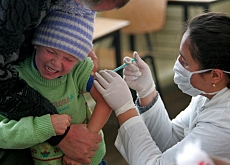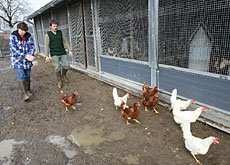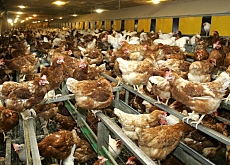Poultry ban could be lifted “within weeks”

The Federal Veterinary Office said on Friday that a national outdoor ban on poultry, introduced on February 20, could be lifted within the next fortnight.
The news came as the authorities in Geneva announced an end to bird flu surveillance zones around Lake Geneva, but similar measures remain in place around Lake Constance in the north of the country.
“We expect a decision from the government at the end of April or the start of May,” Federal Veterinary Office spokesman Marcel Falk told swissinfo. “It’s clear the situation is better. We haven’t had a [bird flu] case in April.”
“On any day we could have new cases which would change the situation, but things look good at the moment. I think if the situation remains as it is today we can lift this ban within the next couple of weeks.”
Geneva was the scene of the first reported case of bird flu in Switzerland. On February 26 a dead duck found in Lake Geneva was later confirmed to have died from the H5N1 strain of the virus.
No new cases of suspected bird flu have been reported in April but a surveillance zone remains around Lake Constance, where several of Switzerland’s 32 bird flu cases have been found.
No new cases
The virus was first identified in Switzerland in February. Nine cases of H5N1 have been confirmed – five on Friday. In Switzerland a total of 1,011 birds have been examined for bird flu.
“Bird flu isn’t over in Switzerland,” said Falk. “We are not finding cases any more but on the other hand we can be quite sure that the bird flu virus will remain in the wild bird population in Switzerland for years to come – our guess is about five-20 years.”
He added: “If the virus is in the bird population, we always have a certain risk that a poultry holding will be infected.”
But fear of bird flu appears to be waning. The Federal Veterinary Office said on Friday that the number of calls from worried members of the public had dropped from around 100 a day to 15.
Ban
In February the Swiss cabinet decided to reintroduce a ban on keeping poultry outdoors, following the discovery of the H5N1 virus in wild swans in neighbouring countries.
Since then chicken, ducks, geese and other domestic fowl have had to be kept under a roof and fenced in to prevent contact with infected wild fowl.
The cabinet’s decision to reintroduce the ban came in response to a request from the Federal Veterinary Office.
“Our goal was that poultry would not get infected by bird flu and we were successful in this,” Falk said on Friday.
Swiss poultry farmers and producers welcomed the ban, saying it was important to reduce the risk of contamination.
Falk said poultry could be ordered back indoors in the future should the situation change for the worse.
“That’s a possibility we cannot rule out, but we are working in the direction that we don’t have to enclose the whole poultry population but probably only in certain areas where one has high densities of water birds and where one really finds cases.”
swissinfo, Thomas Stephens with agencies
The virus was first confirmed in Switzerland in February, with 32 cases among wild birds to date. Nine cases of the deadly variant H5N1 have been reported.
The order to keep poultry indoors were first enforced in Switzerland between October 25 and December 16, 2005.
It was reintroduced on February 20 this year.
The measure affects around eight million birds, including five million chickens and two million laying hens.
In 1981 Switzerland passed animal rights legislation, which included a ban on raising of hens and chickens in battery cages.
Since 1991, after a transition period of ten years, all Swiss poultry has been kept in organic or free-range conditions.
Until recently at least 78% of birds have had access to areas providing outdoor climatic conditions (roofed structures with wire-mesh sides).
Two-thirds of eggs and one-third of chickens produced in Switzerland are produced in free-range conditions.
In the European Union, approximately 80% of poultry is raised in battery cages. The practice is due to be banned in 2012.

In compliance with the JTI standards
More: SWI swissinfo.ch certified by the Journalism Trust Initiative




You can find an overview of ongoing debates with our journalists here. Please join us!
If you want to start a conversation about a topic raised in this article or want to report factual errors, email us at english@swissinfo.ch.